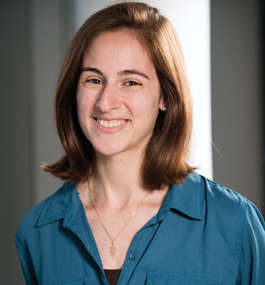Preparing Veterinarians for the Toughest Times

Jonathan King
Ariana Boltax ’14
“Being a veterinarian is not all puppies and kittens,” says Ariana Boltax ’14, an instructor at Cornell University College of Veterinary Medicine.
Sure, vets experience the satisfaction of helping an animal recover from illness or injury. They witness the joy of a family with a new pet. But vets are often part of a more stressful time: an owner’s final moments with a beloved animal.
From a scientific standpoint, Boltax felt well-trained to handle euthanasia. But she didn’t feel as prepared to handle the interactions with clients. How do you respond to an owner who’s crying inconsolably? Or yelling?
Research shows that as many as three-quarters of recent veterinary school graduates don’t feel comfortable performing euthanasias. So, to help her students learn to communicate effectively with grief-stricken clients, Boltax developed a class called Small Animal Euthanasia: Clinical Communication and Practice.
In addition to teaching communication strategies, about 20% of the class is devoted to wellness strategies for the future veterinarians themselves, to help them deal with the emotional distress that causes veterinarians to die by suicide at a disproportionately high rate.
Growing up in Great Neck, New York, Boltax decided to become a veterinarian after seeing her dog go through a hypoglycemic seizure. “It was really scary,” she says. “But wanting to help that dog inspired me.”
At Brandeis, Boltax double-majored in biology and chemistry, and was mentored by several faculty members, including biologists Melissa Kosinski-Collins and James Morris, and chemist Jason Pontrello. “They inspired me as a student to think critically and creatively, to challenge myself, and to love science,” she says.
Boltax, who enjoys doing magic as a hobby, became a teaching assistant in both organic chemistry and biology, as well as a peer academic adviser through the Roosevelt Fellows program. She says, “When a student thinks they can’t succeed and the material finally clicks, it feels a lot like that ‘ooooh!’ moment of a magic trick.”
After graduation, Boltax entered Cornell’s vet school, drawn by its problem-based learning curriculum. After earning a teaching-focused postdoc position, she joined the Cornell faculty last April.
When the COVID-19 pandemic began, Boltax reconfigured her euthanasia curriculum so it worked as an online class. Students practiced communicating with trained actors who played clients exhibiting a range of emotions, including sadness and anger.
Last summer, Boltax’s online class materials won the grand prize in the COVID Educational Creations Contest, an international contest that recognized innovation in veterinary teaching during the pandemic.
The more preparation students have, the more likely they’ll be able to deal with difficult situations in a healthy way, she says. “Euthanasias are sad, but if you can help people avoid feelings of guilt, you’ve created a dying experience that’s more positive — and maybe even beautiful.”
— Abigail Klingbeil
